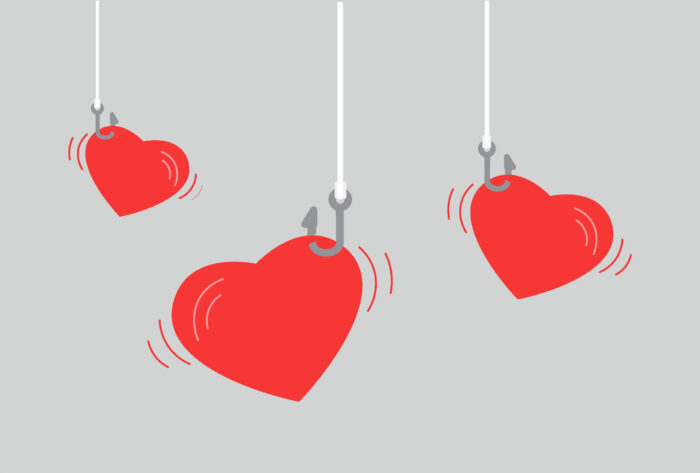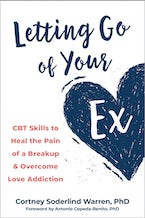By Cortney Soderlind Warren, PhD, ABPP, author of Letting Go of Your Ex
Sometimes people don’t want to hear the truth because they don’t want their illusions destroyed.
-Friedrich Nietzsche
Falling in love is one of the most naturally intoxicating experiences we can have as humans. Sometime between adolescence and early adulthood, someone special catches our attention—they’re interesting, compelling, or attractive in some unique way. We become captivated and find ourselves thinking about them day and night. We want them, crave them, and make efforts to be around them as much as possible because it feels so good when they’re near. Over time, this special someone becomes the center of our world—consuming our time, energy, and internal experience unlike anything else (Fisher, Xu, Aron, & Brown, 2016).
Given how wonderful romantic love feels, it’s not particularly surprising that we tend to make some overly romanticized yet highly flawed conclusions about our mates. Part of what makes the honeymoon phase of relationships so intoxicating is that it’s a time of fantasy, dreams, and great possibility! When our relationship is going well, the lies we believe about our lover may not have noticeably negative consequences to our life—in fact, they probably enhance our experience. But, if we fall in love and then break up, the untrue beliefs we hold can keep us stuck on an ex long after a relationship ends.
Three Lies That Keep Us Stuck on an Ex:
After falling in love and then breaking up, many of the thoughts and beliefs we hold about our exes are inaccurate and unhelpful. Three of the most stubborn are the following:
- “My ex is the best.” After falling in love, it’s really common for us to believe that our lover is the most wonderful, magical, and perfect person in the world because we feel so good around them! Yet, the truth is that our exes are human beings with plenty of faults and flaws—just like the rest of us.
- “I need my ex to be happy.” When we associate pleasure with a lover and pain with a breakup, we often conclude that we need our mate to feel joy, happiness, and positivity in our lives. Yet, the truth is that we can’t ever rely on another person to make us whole, healed, and emotionally secure.
- “My ex will change—or I can change them.” After a bad breakup, it’s very common to think that the relationship isn’t over because our partner will change—or we can change them. Yet, the truth is that we’re powerless to change other people. And although we can’t know the future, it’s possible that they will change, but it’ll only happen if they choose to do the work necessary to shift, not because you changed them.
Working with Unhelpful Beliefs:
Holding onto idealized beliefs about an ex makes it particularly difficult to move on after a breakup because it keeps us stuck in the past in unhelpful ways. The good news is there are many highly effective skills we can use to challenge them.
- Practice cognitive restructuring. Before accepting our thoughts as accurate, it’s important to ask ourselves whether they’re actually true (Beck, 2021). So, ask yourself, what evidence do I have that my ex is the best, that I need them to be happy, or that they’ll change? In addition, we want to ask ourselves how holding onto these beliefs affects us—do they make us feel better or worse? So, ask yourself, if I think this way, how does it affect my feelings, behaviors, and bodily sensations? Anytime our thinking isn’t fully accurate or helpful, we need to challenge it.
- Explore your core beliefs. As we uncover untrue and unhelpful thinking patterns about our ex, we’re often confronted with early childhood learning that’s actually fueling those beliefs (Levine and Heller, 2012). So, ask yourself, what did I learn about myself, love, and romantic relationships as a child that’s affecting my unhelpful beliefs about my ex now? As you connect the dots between early childhood learning and beliefs about your ex, work to challenge them both!
- Use mindful acceptance. Critically evaluating our thinking is an important skill in moving on after a breakup, but sometimes it’s also helpful just to notice and accept your thoughts without trying to change them (Hayes, Strosahl, and Wilson, 2012). Simply becoming aware of them in a nonjudgmental way, acknowledging them, and letting them flow by without allowing them to stick to you is also a great coping strategy.
Take-Home Summary:
The addictive experience of falling in love is what makes it so intoxicating—and also what makes for such intense pain after a breakup. In fact, breaking up can throw us into an addictive spiral of heartache characterized by preoccupation with an ex, cravings for contact, emotional reactivity, and unhealthy impulsive and compulsive behavior that leaves many feeling depressed, anxious, and lost without a clear picture of how to move on (Warren, 2023). When untrue beliefs about an ex keep us stuck, practicing cognitive restructuring, exploring our core beliefs, and using mindful acceptance can jump-start the healing process.
Selected References:
Beck, J. S. 2021. Cognitive Behavior Therapy: Basics and Beyond. 3rd ed. New York: Guilford Press.
Fisher, H. E., X. Xu, A. Aron, and L. L. Brown. 2016. “Intense, Passionate, Romantic Love: A Natural Addiction? How the Fields that Investigate Romance and Substance Abuse can Inform Each Other.” Frontiers in Psychology 7. http://doi.org/10.3389/fpsyg.2016.00687.
Hayes. S. C., K. D. Strosahl, and K. G. Wilson. 2012. Acceptance and Commitment Therapy: The Process and Practice of Mindful Change. 2nd ed. New York: Guilford Press.
Levine, A., and R. S. F. Heller. 2012. Attached: The New Science of Adult Attachment and How It Can Help You Find—and Keep—Love. New York: Tarcher Perigee.
Note: This content is only for informational and educational purposes and should not be considered therapy or any form of treatment. I cannot respond to personal requests for advice over the internet. Best on your continued journey.
Cortney Soderlind Warren, PhD, ABPP, is a board-certified clinical psychologist; and former tenured associate professor of psychology at the University of Nevada, Las Vegas (UNLV). Having won numerous professional awards for her research, Warren is an expert on addictions, eating pathology, self-deception, and the practice of psychotherapy from a cross-cultural perspective. In addition to her academic work, Warren is a speaker, author, and coach with a passion for bringing psychological tools to the public. She earned her doctorate from Texas A&M University after completing a clinical internship at McLean Hospital/Harvard Medical School in 2006.



 2024 Peace Playbook: 3 Tactics to Avoid Clashes with Your Partner
2024 Peace Playbook: 3 Tactics to Avoid Clashes with Your Partner